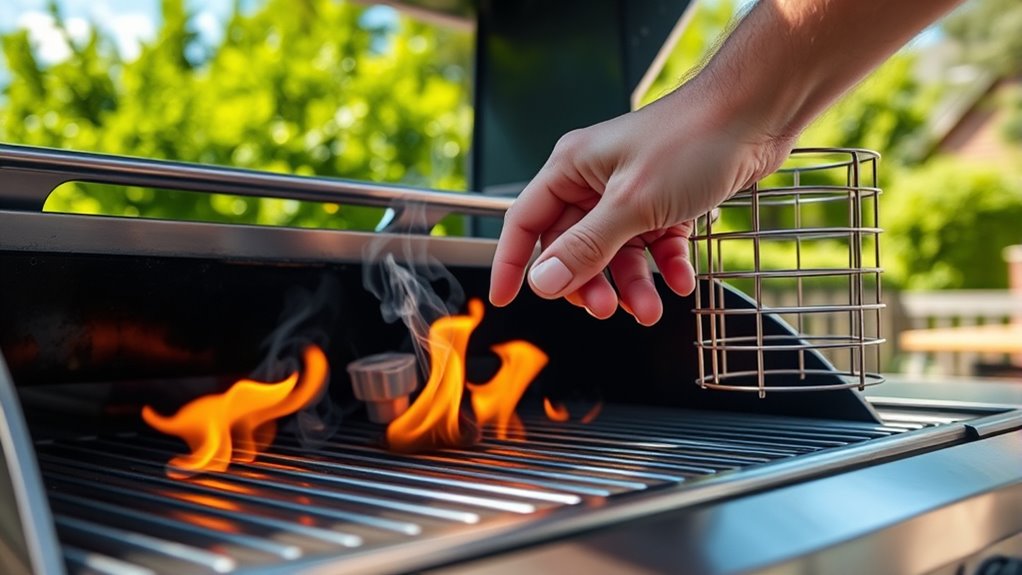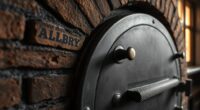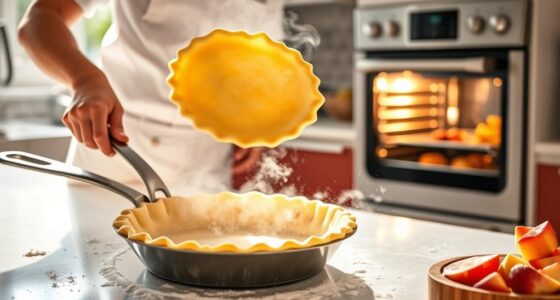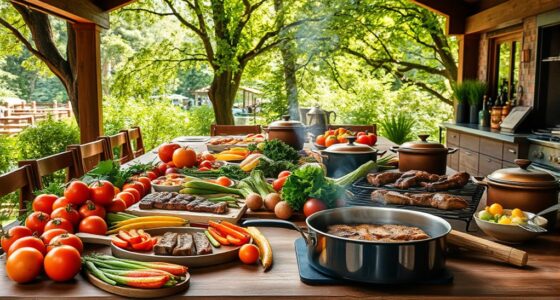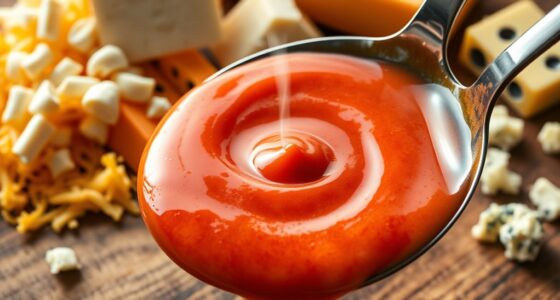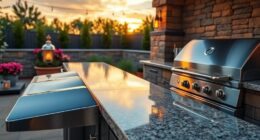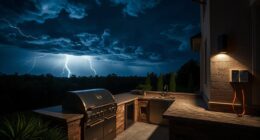To manage flare-ups and prevent burns on the grill, stay attentive and control the heat, especially when cooking fatty foods. Keep a spray bottle of water nearby to safely douse small flames and always use long-handled tools to avoid leaning over flames. Regularly clean grease from grill surfaces to reduce fuel for flames. If flare-ups happen, turn off burners or move food away, and never use water on grease fires. Keep safety equipment close; if you want more tips, continue exploring solutions that keep your grilling safe and fun.
Key Takeaways
- Regularly clean grill grates to prevent grease buildup that can cause flare-ups.
- Use indirect heat zones for high-fat meats to reduce flames and control flare-ups.
- Keep a spray bottle of water nearby to quickly suppress small flare-ups safely.
- Wear heat-resistant gloves and keep fire extinguishing equipment within reach for safety.
- Avoid overcrowding the grill to lessen excess fat drippings and reduce fire risk.
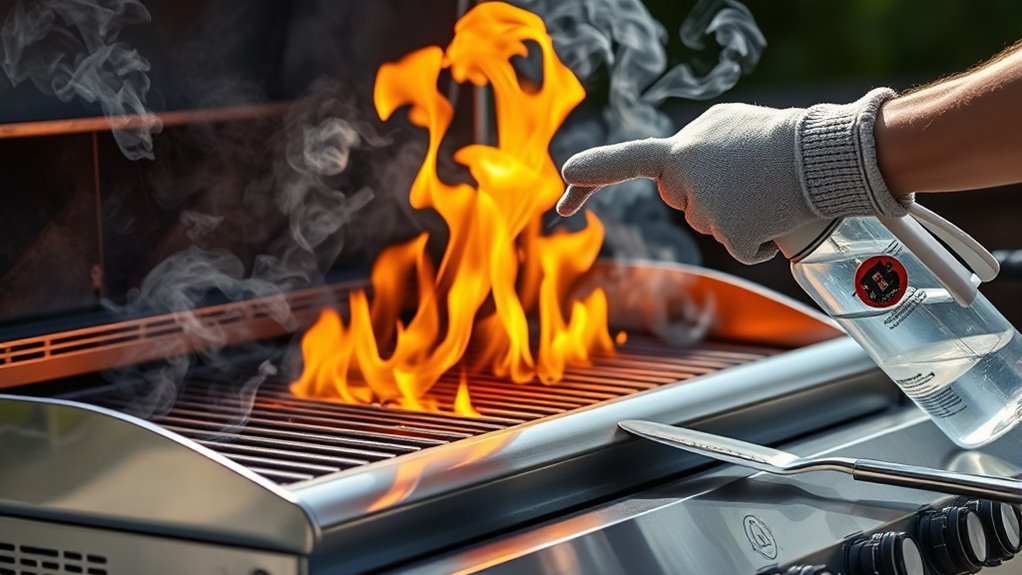
Grill flare-ups and burns can quickly turn a fun barbecue into a dangerous situation if you’re not prepared. Flare up causes are common and can happen unexpectedly, often due to excess fat drippings from meat hitting hot coals or burners. When fat drips onto the heat source, it ignites, creating a sudden burst of flames. This is especially common when cooking fatty cuts or marinated meats that contain oils. Understanding these flare up causes helps you stay alert and take proactive steps to prevent them.
To manage flare-ups safely, it’s essential to practice safe fire handling. Keep a spray bottle of water nearby to douse small flames without disrupting the cooking process. If a flare-up occurs, avoid panicking or using excessive water, which can cause grease splatters. Instead, step back, close the lid if possible, and turn off the burners or move the meat away from the heat source. This minimizes oxygen supply to the flames and suppresses the flare-up. Regularly clearing grease buildup from your grill grates also helps prevent unexpected flare-ups, as accumulated grease acts as fuel for flames.
Practice safe fire handling: keep a water spray, close the lid, and clear grease buildup regularly.
Another key aspect of safe fire handling involves controlling the heat and managing cooking techniques. Don’t overload your grill with too much meat at once, as crowding can increase fat drips and flare-up risk. Use tongs or long-handled tools to turn and move food, keeping your hands and arms away from the flames. When cooking high-fat foods, consider indirect heat zones to reduce direct contact with flames and avoid sudden flare-ups. Additionally, being aware of family influences and personal history can help you better understand and manage your safety habits while grilling.
Burns are another hazard linked to flare-ups, so staying vigilant is vital. Wear heat-resistant gloves and keep a safe distance from the grill when tending to flare-ups. Never lean directly over the flames or attempt to extinguish large fires with water unless you’re sure it’s safe; some fires, especially grease fires, can worsen with water. Keep a fire extinguisher rated for grease fires (Class K) nearby and know how to use it properly. If a fire becomes uncontrollable, evacuate the area and call emergency services immediately.
Frequently Asked Questions
How Can I Tell if My Grill Flare-Up Is Dangerous?
If your grill flare-up gets larger quickly, produces thick, black smoke, or sparks fly out unpredictably, it’s dangerous. These signs indicate a fire safety risk and require immediate action. To prevent flare-up hazards, practice flare-up prevention techniques like controlling grease buildup and adjusting vents. Always stay attentive while grilling, and keep a fire extinguisher nearby. If in doubt, turn off the heat and let the fire subside safely.
What Are Natural Remedies to Soothe Burns From Grilling?
Oh, because a burn from the grill is just a minor inconvenience, right? You can soothe it naturally with herbal remedies like honey or turmeric, but aloe vera gel is truly your best friend. It cools and accelerates healing, making it a must-have in your first aid kit. Just apply generously, sit back, and let nature’s magic work. Burned? Aloe vera’s got you covered, no fancy treatments needed.
Can Flare-Ups Cause Long-Term Damage to My Grill?
Yes, flare-ups can cause long-term damage to your grill if you don’t practice proper grill maintenance and fuel management. Repeated intense heat from flare-ups can warp metal parts, damage burners, and weaken the grill’s structure. To prevent this, regularly clean grease buildup, monitor your fuel levels, and control flare-ups early. Proper maintenance guarantees your grill stays in good shape and performs well for years to come.
Are There Specific Foods That Cause More Flare-Ups?
Ironically, some of your favorite fatty meats and sugary marinades are the biggest flare-up triggers. Foods high in fat, like burgers and sausages, tend to cause more flare-ups because they drip onto the flames, igniting sudden bursts of fire. For food safety, avoid overly greasy or sugary foods if you’re aiming to keep flare-ups under control. Knowing these flare-up triggers helps you enjoy grilling safely and prevents unexpected charring.
How Often Should I Inspect My Grill for Safety?
You should inspect your grill for safety every time you plan to cook. Regular grill maintenance includes checking for gas leaks, ensuring connections are secure, and cleaning grease buildup. Conduct safety inspections before each use to prevent flare-ups and potential fires. By making these inspection routines a habit, you’ll keep your grill in top shape, reduce hazards, and enjoy safe, delicious meals every time you fire it up.
Conclusion
So, next time you’re flipping burgers, remember that a little attention to flare-ups and burns can save your cookout. It’s funny how the grill seems to flare up just when you’re about to flip that perfect steak—almost like it’s playing a game with you. Stay alert, keep your tools handy, and enjoy the sizzle without the burn. After all, a safe grill session makes those flavorful moments even sweeter.
